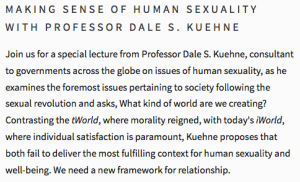This is really about human sexuality and relational fulfillment.
Last Saturday, Trinity Grace Church in Tribeca hosted Dale Kuehne, author of Sex and the iWorld, to talk about human sexuality in the modern age. Dale opened his talk by re-framing the issue. “At its heart,” he said, “the sexual revolution is not about homosexuality or same-sex marriage, but about human sexuality and relational fulfillment. It is about what it means to be human and about sexuality as a subset of that.”
The quality of our lives is guided by the quality of our relationships.
Since some of us may not think the Christian teaching on sexuality is “good news”, however, he began by referencing the teachings of Aristotle, not the Bible. Aristotle argued that humans are made for relationship and, therefore, the quality of our lives is guided by the quality of our relationships. According to Aristotle, Dale said, the relational matrix has four parts: family, neighborhood, city and friends. The first three are relationships of obligation, but the last one – friendship – is voluntary. Family may be irreplaceable, but friendship is the only relationship that can answer the question: if you really know me and have no obligation to love me, would you?
Yet we live in an age of relational hurt.
Although relationships have the potential to give us vibrancy and fulfillment, we live in an age of relational hurt – divorce, rejection, abandonment, transience. In our pain, we are tempted to live independently – by ourselves and for ourselves. In spite of our best efforts, however, loneliness persists. What can be done?
The pursuit of the transcendent will fulfill us.
Aristotle argued that neither objects nor people can fulfill us. In modern terms, think about your dream apartment. Give it three years – new models come out, the neighborhood changes, your family grows. It’s no longer your dream apartment. The same thing happens with people. You may marry your dream spouse, but after a few years, new “models” come out, your spouse changes, your circumstances change. They are no longer your dream spouse. What will fulfill us? Pursuit of the transcendent, said Aristotle. We will be fulfilled when we spend our lives trying to know the not-fully-knowable and search for the not-fully-searchable.
Sex is an appetite; the more you feed it, the more you want it.
What about sex? Aristotle lived in Greek culture, which celebrated sexual exploration. Yet he argued that sex should be confined to marriage. He said that sex was an appetite and, the more you feed it, the more you want it. If sex happens outside of marriage, then it happens between friends and sex between friends does not enhance the friendship; it detracts from it.
The best and deepest relationships do not have to be sexual.
The idea that sexuality is key to having deep relationships does not really come about until the 1960s with the sexual revolution. The best and deepest relationships do not have to be sexual. The New Testament has no sense that you have to be married or having sex to be fulfilled. At Pentecost (Acts 2), God is basically saying, “I am filling you. This is relationship on steroids.” The Church becomes the fundamental fulfilling relationship – whether you are married or not. We may live in an age that has lost faith in love and relationships, but we have the opportunity to show that there is something more, that Church is better than sex.
To be continued (more to come on relational consequences, challenges and opportunities) …

Source: http://cityrenewal.org/events/




Sounds like the kind of seminar I would have enjoyed.
Bethany, was the idea that the Church is the fundamental fulfilling relationship yours or his? I think it’s pretty spot on, especially when we consider the metaphor of Body which Scripture uses. Body—working together, living together, protecting one another, healing one another, etc.
Good stuff…
Luma, Good to hear from you! I agree – it’s an important insight. Both Dale and Jon Tyson (TGC pastor) said that the church, in an ideal world, fulfills the relational role (spoiler alert: this is part 3 in my series).
Also, both of them mentioned the book, When the Church Was a Family, which happens to be on sale today for $2.99 over at Gospel e-Books: http://www.gospelebooks.net/discount-christian-ebooks/when-the-church-was-a-family.html.
The concept of human identity as relationship is consistent with how Scripture describes imago dei identity. Theologian Anthony Hoekema argues that human personhood is the triangular structure of relationship to God, relationship to others, and relationship to Creation. When these three things align and work in coordination, we experience our full humanity and the glory of God’s nature radiates through our lives like light through a prism.
Way to end your article with a punch. I’m quoting you on that. ;)
Made me think of the movie “Once” …